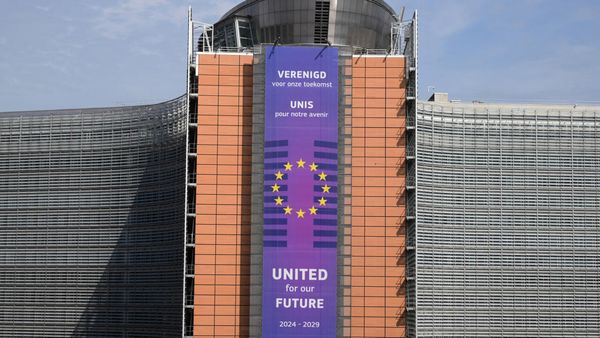Along with a windfall from increased defense spending by NATO allies in Europe and from demand created by wars raging in Ukraine and the Middle East, Lockheed Martin faces possible blowback from U.S. trade war policies. Politicians in Switzerland began pushing to scrap a multibillion-dollar contract for Lockheed Martin F-35 fighter jets.
Reports say lawmakers, especially from left-leaning parties, are asking the Swiss government to reevaluate the acquisition of the F-35 Lightning II in retaliation for a 39% U.S. tariff on Swiss imports.
It is one of the highest tariffs slapped on any country. It is also far more than the 15% tariff reached in a deal with the European Union. Switzerland, historically a neutral country, is not part of the EU, nor a member of the North Atlantic Treaty Organization.
Nearly 40% of Swiss exports to the U.S. are drugs or chemicals, many of which don't pay tariffs. The White House is looking to impose heavy tariffs on pharmaceuticals.
On Monday, President Donald Trump posted on social media that gold will be exempt from U.S. tariffs. That's a relief for Switzerland, which is the world's largest gold refining hub. Gold is the country's largest export, accounting for 27% of exports.
A draft resolution has been introduced to the Swiss parliament to terminate the F-35 contract. It could be considered as early as September, reports say.
On Thursday, President Karin Keller-Sutter said Switzerland will stick to the F-35 deal and another for the Patriot air-defense system. Lockheed makes PAC-3 missiles for the Patriot Systems, as well as portable Javelin anti-tank missiles which have seen heavy use in Ukraine.
"The Federal Council has repeatedly affirmed that it is sticking with the F-35," Keller-Sutter told Reuters." If we didn't do that, we would have no air defense." Her remarks came one day after she met with U.S. Secretary of State Marco Rubio on trade and defense issues. Swiss officials still hope to work out a more favorable agreement.
Lockheed Martin Deal Tops $7 Billion
The Swiss government agreed in 2021 to acquire three dozen F-35 Lightning II warplanes for 6 billion Swiss francs — what would be $7.38 billion in today's dollars. Some reports say the deal could be worth up to 7.3 billion Swiss francs (or about $9 billion).
A Lockheed Martin spokesperson told IBD that foreign military sales are government-to-government transactions, and the matter is best addressed by U.S. or Swiss government officials.
Switzerland could follow Spain in setting aside the F-35. Last week, the Spanish government said it was no longer considering the F-35 for its air force. The Madrid government plans to spend most of the additional 10.5 billion euros for defense this year in Europe. That rules out buying U.S.-made warplanes, reports said.
Canada and Portugal also are rethinking F-35 purchases, and India seems lukewarm, the Economic Times of India reported.
However, other European nations plan to purchase more F-35 fighters, including Belgium and the U.K., according to Aviation Week. Denmark may follow shortly.
Stock Down More Than 12%
Lockheed Martin stock is down more than 12% year to date, trading well below its 50-day and 200-day moving averages, which are trending lower. Its IBD Composite Rating is 57.
The stock slid nearly 11% on July 22, after second-quarter earnings fell to $1.46 per share from $6.85 per share a year earlier. Revenue increased slightly to $18.2 billion. Both figures missed analysts' expectations.
Lockheed recorded $1.6 billion in pretax losses on different programs, plus $169 million in charges during the quarter, which impacted earnings by $5.83 per share.
Last year, the company's aeronautics segment, which includes the F-35, accounted for about 40% of total sales of more than $71 billion, per FactSet.







